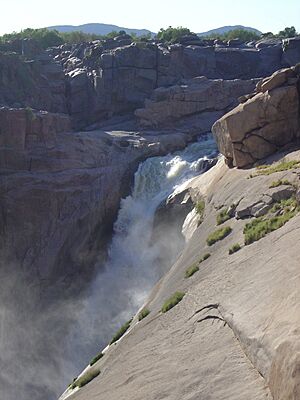Augrabies Falls facts for kids
Quick facts for kids Augrabies Falls |
|
|---|---|

Augrabies Falls
|
|
| Lua error in Module:Infobox_mapframe at line 185: attempt to index field 'wikibase' (a nil value). | |
| Location | Northern Cape, South Africa |
| Coordinates | 28°35′29″S 20°20′27″E / 28.59139°S 20.34083°E |
| Type | Cascade |
| Total height | 56 metres (183 ft) |
| Average width | 24 metres (80 ft) |
| Watercourse | Orange River |
| Average flow rate |
313 cubic metres (11,050 cu ft) |
The Augrabies Falls is a waterfall on the Orange River, the largest river in South Africa. Since 1966 the waterfall, set in a desolate and rugged milieu, is enclosed by the Augrabies Falls National Park. The falls are around 183 feet (56 m) in height. Some sources cite an approximate height of 480 feet; this is actually the height from the base of the canyon to the top of the walls, not that of the falls themselves.
Contents
Exploration
The original Khoikhoi residents named the waterfall "Ankoerebis" — "place of great noise" — from which the Trek Boers, who settled here later on, derived the name, "Augrabies". The last leader of area's native residents was Klaas Pofadder who lived on an island upstream of the falls, now known as Klaas Island. The first westerner to see the falls was the renegade Swedish mercenary Hendrik Jakob Wikar. He arrived at the falls in October 1778, after years long wanderings in the wilderness. When another traveler, George Thompson, was led to the falls by his Koranna guides in 1826, he named it after King George IV.
Size
The Augrabies Falls have recorded 7,800 cubic metres (280,000 cu ft) of water every second in floods in 1988 (and 6,800 cubic metres (240,000 cu ft) in the floods of 2006). This is over three times the average high season flow rate of Niagara Falls of 2,400 cubic metres (85,000 cu ft) per second, more than four times Niagara's annual average, and greater than Niagara's all-time record of 6,800 cubic metres (240,000 cu ft) per second. The gorge at the Augrabies Falls is 240 metres (800 ft) deep and 18 kilometres (10 mi) long, and is an impressive example of granite erosion.
Images for kids
See also
 In Spanish: Cataratas Augrabies para niños
In Spanish: Cataratas Augrabies para niños




